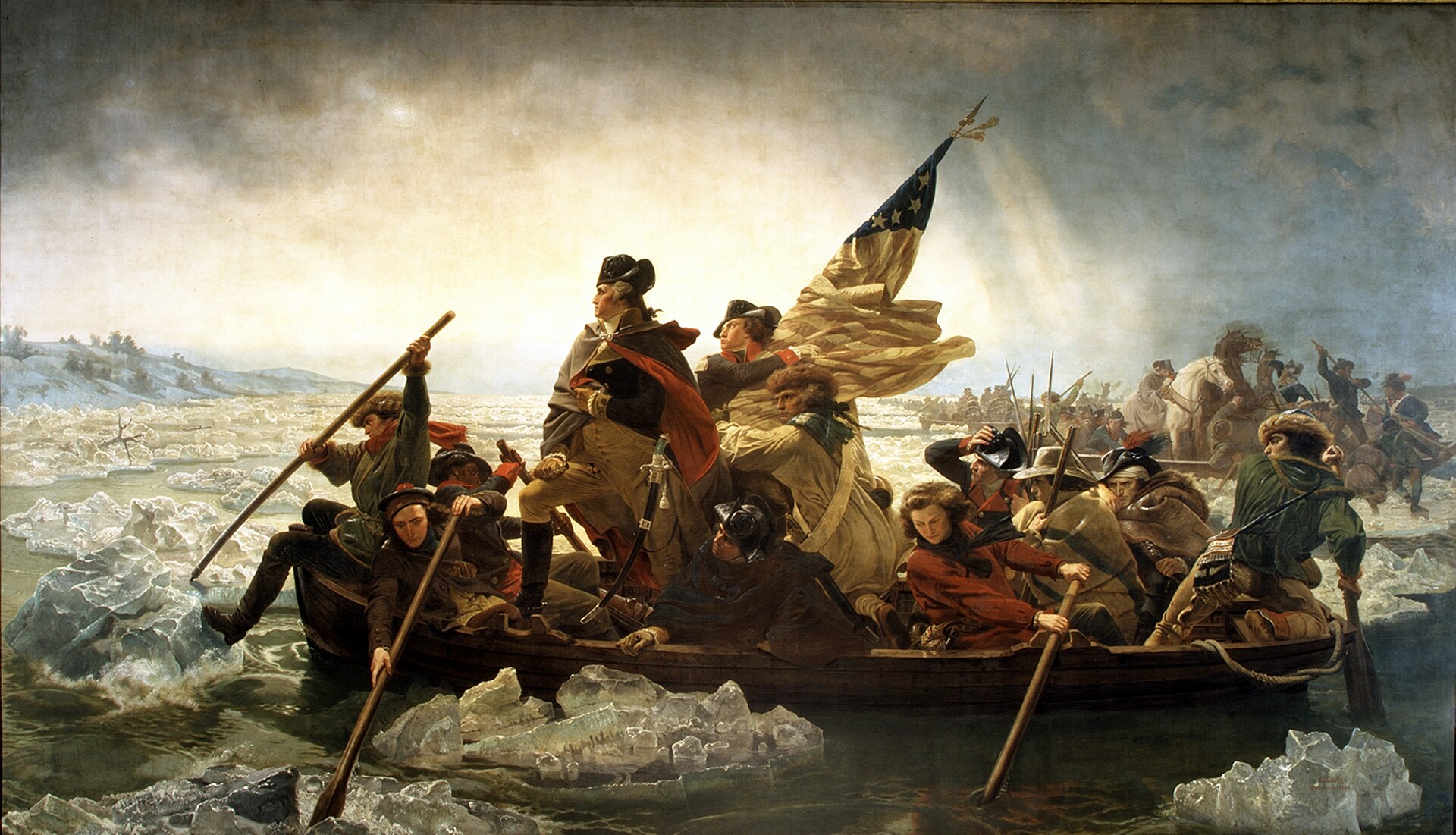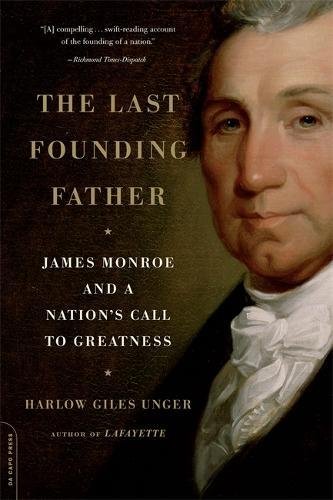“A little flattery will support a man through great fatigue.”
James Monroe
To begin, a word on the text. For the fifth president I chose The Last Founding Father: James Monroe and a Nation’s Call to Greatness by Harlow Giles Unger. At this point I realize how much the biographer’s tone and personal take on each Commander in Chief shapes how I (and by extension, posterity) view these historical figures. In this case, Unger is almost comically sycophantic to his subject. He employs elaborate descriptions of Monroe and goes to great lengths to argue his wife Eliza was NOT a cold, snobby bitch; that Madison was a twerp and Monroe basically ran the White House the last two years of Madison’s second term; that his three predecessors were merely game managers that stumbled along until Monroe got there; that Monroe’s merciless handling of slave rebellions, acquisition of slaves himself and no action whatsoever to stop slavery was besides the point; and finally that Native Americans were all scalp-seeking marauders. The book was informative, but had a painfully clear bias.
Biases aside, I learned a lot! And that’s the whole idea. James Monroe was in the mix with the Founding Generation his entire life. Another Virginian and secondary protégé of Thomas Jefferson, Monroe would spend over 40 years in public service. His resume was so grandiose by the time it was his turn in the Virginia Dynasty, he almost won the Presidency unanimously. How could you argue against a Revolutionary War vet, Virginia Executive Council member, Confederation Congress delegate, US Senator, minister to France (and Spain and England), Governor of Virginia, Secretary of State and Secretary of War who helped close out the conflict with Britain in 1815? They didn’t!
As impressive as his bona fides was the roster of intimate friends Monroe made over his public life. He once saved Thomas Paine’s life. He freed the Marquis de Lafayette’s wife from prison and smuggled the Marquis and his family out of France to escape persecution. He dropped out of college to fight in the Revolution with his good friend John Marshall, future Chief Justice of the inaugural Supreme Court. With tensions rising against his one-time friend Alexander Hamilton, Monroe was talked out of a duel with the Caribbean firebrand by his second…..Aaron Burr. You just can’t make this stuff up. Oh, and the man holding the flag in the famous “Washington Crossing the Delaware” painting? Yeah, that’s J Mo too. (ed. note: For all you history pedants out there, I’ll mention that Monroe actually crossed on a different boat than GW and that the flag in the painting is anachronistic).
He had the resume and the connections, but before Monroe got to the throne, he actually voted against ratifying the Constitution. He joined others at the Virginia Ratifying Convention like Patrick Henry and George Mason, who objected to a laundry list of issues. Among the main objections from the Old Dominion: no term limits for President or Congress; Supreme Court cases without juries; lack of a Bill of Rights; taxation without consent of local legislatures; the ability to send federal troops into states to enforce laws; and the ability to outlaw slavery, which they feared would ruin the economy of the South. Monroe in particular also feared the ceding of navigation rights on the Mississippi to Spain and that a standing army would lead to dictatorship. Despite these myriad complaints, his fellow statesmen outvoted his faction 89-79 and Virginia became the tenth of the new United States.
Historians often cite the Monroe Doctrine or The Era of Good Feelings when they discuss James Monroe. I was struck by his (mis)handling of two other things: money and slaves. On the pecuniary side, Monroe took after his mentor. He spent lavishly, always above his means, and found himself land rich, cash poor and constantly seeking a line of credit. While minister to France he bought a palatial home called La Folie de la Bouexiere. Monroe thought it would become the US Embassy in France and be owned by the government. However, Congress refused to pay him back, stating he never had authorization to buy it in the first place. This would put him even deeper in debt. Yet, somehow, he was able to manage the country’s finances much better…for a time. By his second year in office, largely because of the Western land acquisitions being sold, Monroe had liquidated the $67 million debt incurred by the War of 1812. With the national debt wiped out, abundant land acquisitions out West and the country at peace Monroe was able to fulfill the dream of every libertarian ever born: he eliminated all federal taxes. “In contemplating the happy situation of the United States…I consider it my duty to recommend to Congress their repeal.” Inevitably, speculators fucked it up. In 1819 there was a financial panic with hundreds of banks shutting down that couldn’t back the mounting false claims of lands out west. The Constitution left banking to the States, so there could be no federal intervention. It makes me wonder if he turned to his Cabinet and said, “See! I TOLD you not to ratify it!”
On the slavery issue, Monroe is alternately given a pass or damned to hell depending on the authorship of what you read. The pass givers nod in agreement when Monroe posited that slavery was “an existing evil which commenced under our colonial system, with which we are not properly chargeable.” The Director’s Cut of the Declaration of Independence – before Congress trimmed it down – included such arguments. Monroe was so in favor of slaves being removed to the far West, or to an allied territory or island, he became the second US President to have a national capital named after him. Here’s looking at you Monrovia, Liberia.
The damners have ample fodder for critique. In addition to being a slave owner all his life, Monroe put down Gabriel’s Rebellion with tragic force, ordering 27 men, including Gabriel, to be hanged slowly by the neck instead of dropping them to break it, so it would send a message to other slaves thinking of revolt. Slave laws in Virginia were also tightened after the incident. If that incident affected only a limited geography, Monroe would expand his impact on the future of the “peculiar institution” with the Missouri Compromise of 1820. To kick the slavery can down the road, Monroe “winked it away” by granting statehood to both Maine (free) and Missouri (slave) to maintain the balance in the Senate and draw a line above which no slave states could enter the Union. This would be another large step in the direction of eventual civil war as it allowed slavery to expand unabated below the line.
James Monroe’s legacy seems to have arrived in posterity in a mostly positive light. While he was in charge the country grew both in physical size and economic prosperity. Without foreign threats of war, his administration was able to turn inward and push for infrastructure improvements and national unity. And, frankly, he was probably a much better president than at least two of his four predecessors. As the last of the Virginia triumvirate, he faces the same critiques today as Jefferson and Madison. Here trod those that spoke of freedom and equality among men, yet bought and sold those of a darker shade as though they were livestock. Also like his mentors, Monroe died heavily in debt and always spent well beyond his means. The main through line of this quest has been a simple one. People are as complex as they are fallible. Even Presidents.
Trivia
- Died on the 4th of July (1831)
- First former Senator to be President
- Would have LOVED C-SPAN – fought hard against secrecy rules of the Senate.
- Maria Hester, his younger daughter, was the first child of a President married in the White House….to her first cousin.
- The infamous Don’t Tread on Me! flag was used by his Virginia regiment.
- Only American President besides Washington to have a national capital named after him – Monrovia, Liberia
- Upon Senate election to New York, wife Eliza immediately had their children inoculated against smallpox
- Voted against ratification of the Constitution
- He’s the one holding the flag.

Follow-up Reading
- The Civil War of 1812 by Alan Taylor
- Another America: The Story of Liberia and the Former Slaves Who Ruled It by James Ciment
- James Monroe’s 7th State of the Union Address, 1823 (The Monroe Doctrine speech)


1 thought on “Can You Tell Me The Way to Liberia?”
Pingback: America Was An Only Child – Library Card Life